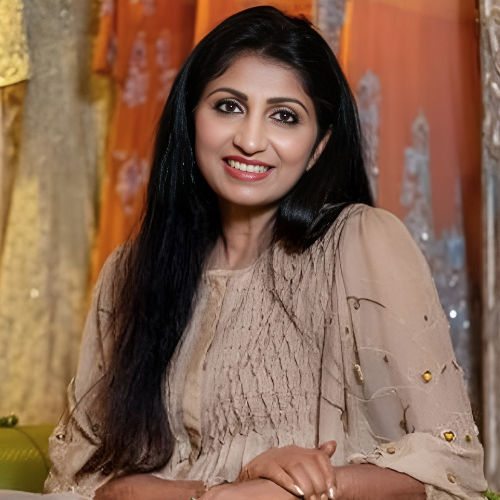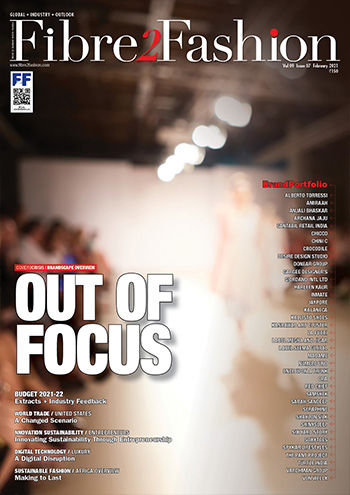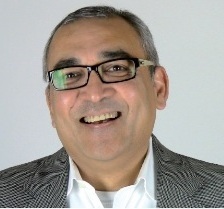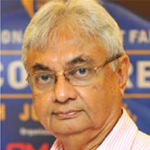
Archana Jaju
Founder
Label Archana Jaju
Exquisite Indian craftsmanship
Archana Jaju’s Hyderabad-based eponymous label works with artisans from 17 different clusters across India to come up with classic handcrafted wears for men and women. Jaju talks about her brand and more.
Fibre2Fashion: What is the story behind founding of the brand?
Archana Jaju:
As a child I was quite creatively inclined, redesigning my grandmother’s old clothes and giving them new life. After being married into a textile family, it was my father-in-law who encouraged me to hone my skills and helped me lay the foundation for what I loved and was truly passionate about. The next years were a blur of constant hard work, countless crafts and numerous creative techniques that went behind starting my dream business.
F2F: Which crafts do you work with and in which pockets of India?
AJ:
We work with artisans from various craft clusters across India. Some of these include kalamkari from Sri Kalahasti in South India, bandhani from Kutch, lucknowi from Lucknow, parsi gara from the remote interiors of Bengal, khadi from Srikakulam and venkatgiri, kanjeevarams from Chennai, banarasis from Varanasi, providing livelihood to around 200 families. We are focused on bringing India’s fine craftsmanship into the everyday.
F2F: What attributes do you look for in a crafts person?
AJ:
We engage with craft clusters from all corners of India and are always on the lookout for artisans whose skills we can transform into beautifully crafted outfits.
F2F: How does your supply chain network work?
AJ:
We work in tandem with various craft clusters. All our clothes are handcrafted and manufactured by us and are sold under the label Archana Jaju. We stock at multidesigner stores in many cities and retail through Instagram.
F2F: Sustainability and circularity are the buzz words today. How do you incorporate them into your product lines?
AJ:
Sustainability is talked about in media and seminars all around the world. Our main aim is to transform our business modules and reduce overall impact on the environment. There are many practises like fair wages to artisans, usage of organic dyes, hand painted work and handwoven fabrics that we observe to ensure sustainability.
F2F: What are your long-term sustainability goals?
AJ:
Developing finely crafted products by skilled artisans is where our focus lies. Our conscious approach brings us closer to our goal of achieving optimal sustainability with each passing day.
F2F: Coming back to the label, who are your target audience? What is your market positioning?
AJ:
Our target audience is the 18 years and above discerning consumer. We are grateful to have built a reputation within Indian fashion for our singular style, luxury textiles, exquisite Indian craftsmanship and attention to detail.
F2F: What is the USP of your products?
AJ:
We offer handcrafted luxury.
F2F: Which are your major markets? What is the retail and web presence of your brand like? What is the price point of the clothes?
AJ:
Our major markets are Hyderabad, Delhi and Mumbai. We retail through online and offline channels at multiple stores across India. In Mumbai, we retail at Aza. In Delhi you can find us at Ogaan and Anantam and in Ahmedabad at Elan. ₹19,500 is the starting range of our products that do well.
F2F: Which other product categories do you plan to move into future?
AJ:
Currently we are focusing only on womenswear and menswear.
F2F: What has been the impact of Covid in terms of sales, staff cutdown, rentals etc?
AJ:
Sales did take a hit as people were prioritising necessities over luxury but as things started opening, the brand saw a steady rise in sales as well. With intimate weddings trending everywhere, sales are likely to get back to normal soon. With respect to staff, we ensured all our artisans were retained and supported through these unprecedented times.
This interview was first published in the Feb 2021 edition of the print magazine
Fanny Vermandel
Pradip Mehta
Aseem Prakash
Abhay Gupta
Arun Sirdeshmukh
Anurag Batra
Rahul Mehta
Rahul Mehta
Bill D’Arienzo
Gabi Seligsohn


20230103183907.png)







_8.JPG)



